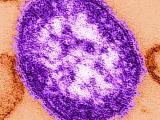Today the World Health Organization (WHO) says no region in the world has successfully eliminated measles, and cases have surged in the past year, with 10.3 million people infected in 2023.
The WHO published its findings in a report in Morbidity and Mortality Weekly Report.
"The number of measles infections are rising around the globe, endangering lives and health," said Mandy Cohen, MD, MPH, director of the US Centers for Disease Control and Prevention, in a WHO press release on the findings. "The measles vaccine is our best protection against the virus, and we must continue to invest in efforts to increase access."
The rise in cases occurs against a backdrop of diminishing measles vaccine uptake. Only 74% of children globally have received the recommended second dose.
Deaths top 100,000
During the COVID-19 pandemic, estimated first dose of measles-containing vaccine (MCV1) declined to 81%, the lowest level since 2008, the authors of the report wrote. In order for measles to be controlled, coverage of 95% or greater of two doses of measles vaccine is needed to ensure transmission is eliminated. In all WHO regions except Africa, at least one country has reached elimination.
We must invest in immunization for every person, no matter where they live
"Measles vaccine has saved more lives than any other vaccine in the past 50 years," said Tedros Adhanom Ghebreyesus, PhD, WHO director-general. "To save even more lives and stop this deadly virus from harming the most vulnerable, we must invest in immunization for every person, no matter where they live."
Since 2020, no country has been able to reach their 2019 first-dose coverage level, the report said. In 2023, MCV1 coverage was 64% in low-income countries, 86% in middle-income countries, and 94% in high-income countries. And 57 countries in five WHO regions reported large or disruptive measles outbreaks, a jump from 36 countries in 2022.
Last year, estimated measles cases increased 20%. Most notably, deaths from measles dropped by 8% from 2022 to 2023, but the virus still killed an estimated 107,500 people, mostly children younger than 5 years of age.
When children survive measles, they can carry lifelong complications from infection, including blindness and brain damage.



















